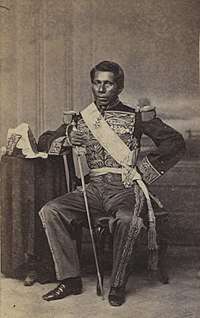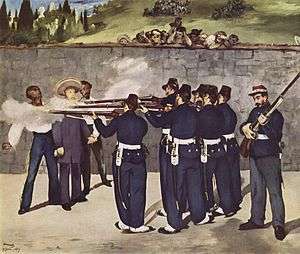Tomás Mejía Camacho
José Tomás de la Luz Mejía Camacho, better known as Tomás Mejía (September 17, 1820 – June 19, 1867), was a Mexican soldier. He was of Otomi indigenous origin and came from a humble background, studying in the local rural school. He was a loyal Catholic siding with the conservatives during the Reform war and later the Second French Intervention.

Service
Born in Pinal de Amoles, Sierra Gorda, Querétaro, he served in the Mexican Army from 1841 to 1867, fought against the Americans in the Mexican-American War where he distinguished himself at the Battle of Buena Vista. He sided with the conservatives during the reform war in opposition to the separation of church and state during liberal reforms. After the war was lost, he fought as a cavalry general on the side of Maximilian I of Mexico during the war between Monarchists and Republicans after the French intervention in 1862 and the rise of the Second Mexican Empire in 1863–1864. Overall, Majía would wage guerilla war in the region of Sierra Gorda around 8 years.
Unfortunately, the war was again lost with the French, conservatives, and imperialists retreating. The general was surrounded with the emperor at Querétaro where the months of being besieged led to a republican victory. He was executed by the Liberal Republicans, together with General Miguel Miramón and Emperor Maximilian I in Querétaro in 1867 ending the Second Mexican Empire along with the conservative cause.

Sources
- Hamnett, Brian. "Mexican Conservatives, Clericals and Soldiers: the 'Traitor' Tomás Mejía through Reform and Empire, 1855-1867." Bulletin of Latin American Research 20, no. 2 (2001): 187–209.
External links
![]()